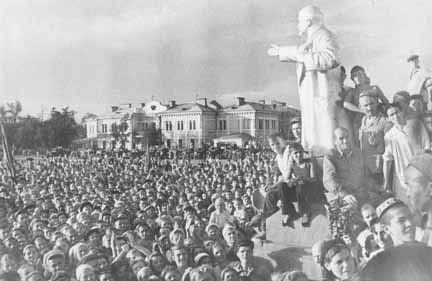For this week’s blog post I decided to focus on the question: what role did nationality and religion play in the formation of the Soviet State? I first checked out the subject essay by Lewis Siegelbaum, “The Muslim East” to see if I could get an overview of what was going on between the Soviet government and the Russian/Eastern Muslims. What I got what that, “the Soviet government for its part appealed to “Moslems of Russia and the East” to throw in their lot with the revolution, promising them the inviolability of their faith and customs and national self-determination.” (Siegelbaum) After reading two primary sources about this topic I have to concur with this statement.

In December 1917 Stalin and Lenin wrote from the Council of People’s Commissars an “Appeal to the Moslems of Russia and the East”. When I first read this all I could think of was it sounded like an email from a presidential candidate trying to get you to donate money. “Great events are taking place in Russia…A new world is being born…The power in the country is in the hands of the people…” They start is off with how the war is over and they are changing. That we are all free now thanks to the leader of this revolution, the Soviet of People’s Commissars. Then they get to their main point, “in the face of these great events we turn to you, toiling and disinherited Moslems of Russia and the East.” They are saying your beliefs and culture is free now because of the Soviets and we need you to help defend them. They mention that you won’t be a slave, but we still really need to you fight against Europe. “We await your sympathy and support in this cause of building a new world.” So did this work? Did they appeal to the Moslem people?

After reading the second primary source my answer is yes. In June 1923 the Russian Administration for Religious Affairs of Russian Moslems made a “Proclamation to All Moslems in the World”. The proclamation starts by saying that the oppressor of Islam (the British) is going after the Soviet government (the protector of the oppressed). It’s a short document essentially saying that the whole Moslem community believe everything the British are saying about the Soviet’s to be untrue, and that the Soviet government had always supported them. “The Moslems of the whole world must not forget this and must thank the Soviet Government. We, the Moslems of Russia, consider the Soviet Government the protector of the oppressed and declare to the four hundred million Moslems of the world the necessity of full support of the Soviet regime.”
So to answer the question, the Soviet State needed more people on their side of the revolution so they appealed to people who also needed support. Whether or not they believed or agreed with the Moslem people is not really the point here. They made them an offer and almost 6 years later the Moslem people were still fighting for them, so it seems up until this point it worked for both sides.
Sources:
- http://soviethistory.msu.edu/1921-2/the-muslim-east/
- http://soviethistory.msu.edu/1921-2/the-muslim-east/the-muslim-east-texts/appeal-to-the-moslems-of-russia-and-the-east/
- http://soviethistory.msu.edu/1921-2/the-muslim-east/the-muslim-east-texts/proclamation-to-all-moslems-in-the-world/
- http://soviethistory.msu.edu/1921-2/the-muslim-east/the-muslim-east-images/#
This post earned a “red star” award from the editorial team!


Good job picking up on the promise of self-determination. This will become a point of major contestation throughout the history of the USSR. How do you think this promise could cause problems for the Soviets in the future?
LikeLike
Well if they aren’t planning on honoring the promise then that will definitely cause some issues, and I’ve briefly read about anti-religious propaganda and the anti-religious movement so I’m definitely sensing some issues on the rise.
LikeLike
I loved how you set the question up and explained how you came to an answer, it made what could be a complex problem seem relatively simpler to understand. I see that the Moslems believed that they were fighting for the correct side, but did this group of people ever feel like they had supported the wrong side? I did my blog on the anti-religious movements of how the Soviets wanted nothing more than to ban religion and it seems that if Moslems were promised religious freedoms certain complications may arise later on in the future (possibly near future).
LikeLike
I think your post highlights the importance of politics over ideology. While the Soviet government was pushing a policy of atheism, consistent with Marxist theory, there was also the competing need to gain support for their government. Sometimes one has to chose between politics or ideology and often times, politics is chosen because it has greater affect on the future. Giving freedom to the Muslim population was a conscious choice over ideology to ensure greater support and strength in the future.
LikeLike
I think it was extremely interesting that the Soviets decided to appeal to the Muslims in the East of their country because in the later years of their empire they focused a lot of energy on repressing the Muslims and furthermore they invaded a Muslim country, Afghanistan. Once the Soviet Union fell then Russia had more problems with their Muslim population. So I think this post was a great one and also discussed an issue that remained prevalent throughout the 20th century.
LikeLike
You’ve got lots of good comments here about the substance of your post, so I’ll respond to two things: 1) the images are really nice, especially the Turkmen horsewomen and 2) I really enjoy the tone here — it’s conversational and clear, without being simplistic. I want to read more!
LikeLike
Well written. Your post shows that the early Soviet leaders clearly understood the importance of having its Muslim minority on its side. It is an issue that would continue to be pressing throughout the life of the USSR, and the Soviet Union would later be haunted by demographic troubles later in its life.
LikeLike